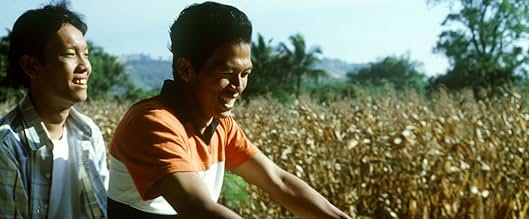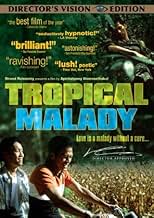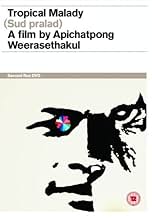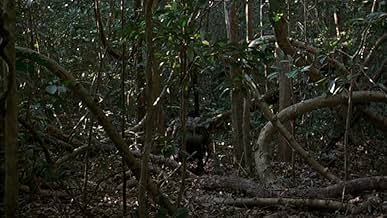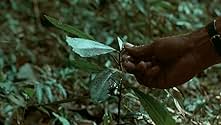AVALIAÇÃO DA IMDb
7,1/10
6,6 mil
SUA AVALIAÇÃO
Adicionar um enredo no seu idiomaA romance between a soldier and a country boy, wrapped around a Thai folk-tale involving a shaman with shape-shifting abilities.A romance between a soldier and a country boy, wrapped around a Thai folk-tale involving a shaman with shape-shifting abilities.A romance between a soldier and a country boy, wrapped around a Thai folk-tale involving a shaman with shape-shifting abilities.
- Direção
- Roteirista
- Artistas
- Prêmios
- 7 vitórias e 8 indicações no total
Avaliações em destaque
"Greed is our downfall. I was watching Who Wants to be a Millionaire. The woman won a lot of money but wouldn't stop playing. She lost and only got 30.000 Baht."
"The tiger trails you like a shadow. His spirit is starving and lonesome. I see you are his prey and his companion."
The experimental creator of "Mysterious Object at Noon" is back with another abstract gem, "Tropical Malady." This time we have a 2-parter connected by common themes and metaphors, a la Wong Kar Wai's Chungking Express, equally casual but much slowly paced here. The first part of the film is set in everyday world. A gay soldier pursues a young country boy. The boy is most likely not gay, but he returns the attraction most of the time, probably because he is attracted to the soldier on another level (e.g. he is fascinated by the soldier's uniform). One day, while the soldier is flipping through the boy's photo album, suddenly the movie blacks out -- enter part 2, a story inspired by legends that parallels part 1, but from an alternative angle that makes it challenging to detect the patterns. Set in the dark tropical forest, the soldier relentlessly hunts a tiger ghost spirit for love, fear, or both (foreshadowed by a shooting computer game played by the boy who later appears as the tiger spirit). The tiger is fascinated by the soldier's sound device. The soldier is warned that he must either kill the tiger or be devoured by it.
Part 1 and part 2 are both about desire and pursuit, and essentially follow the same path. In both, the soldier makes great effort to pursue his passion, but it leads him nowhere. He is incompatible with the partner of his desire, so it cannot be satisfied in the case of a straight boy or a tiger. The soldier can be classified as greedy, and it will be his downfall. The 'fairytale-esque' romance in part 1 seems almost Utopian, but it's an illusion that cannot be sustained. In the end he will be consumed by his desires.
This is a powerful and challenging film with 2 segments, each providing a distinctive context to view the same patterns. With only 2 or 3 lines of dialogue in the second part of more than 65 minutes, it's a highly sensual and contemplative experience, where every drop of water, wind gently brushing the leaves, and sound of birds singing contributes to your senses. You can literally smell the mud in the fresh rainforest.
The photography is undeniably beautiful. The last shot of the film is sheer poetry that will take your breath away.
"The tiger trails you like a shadow. His spirit is starving and lonesome. I see you are his prey and his companion."
The experimental creator of "Mysterious Object at Noon" is back with another abstract gem, "Tropical Malady." This time we have a 2-parter connected by common themes and metaphors, a la Wong Kar Wai's Chungking Express, equally casual but much slowly paced here. The first part of the film is set in everyday world. A gay soldier pursues a young country boy. The boy is most likely not gay, but he returns the attraction most of the time, probably because he is attracted to the soldier on another level (e.g. he is fascinated by the soldier's uniform). One day, while the soldier is flipping through the boy's photo album, suddenly the movie blacks out -- enter part 2, a story inspired by legends that parallels part 1, but from an alternative angle that makes it challenging to detect the patterns. Set in the dark tropical forest, the soldier relentlessly hunts a tiger ghost spirit for love, fear, or both (foreshadowed by a shooting computer game played by the boy who later appears as the tiger spirit). The tiger is fascinated by the soldier's sound device. The soldier is warned that he must either kill the tiger or be devoured by it.
Part 1 and part 2 are both about desire and pursuit, and essentially follow the same path. In both, the soldier makes great effort to pursue his passion, but it leads him nowhere. He is incompatible with the partner of his desire, so it cannot be satisfied in the case of a straight boy or a tiger. The soldier can be classified as greedy, and it will be his downfall. The 'fairytale-esque' romance in part 1 seems almost Utopian, but it's an illusion that cannot be sustained. In the end he will be consumed by his desires.
This is a powerful and challenging film with 2 segments, each providing a distinctive context to view the same patterns. With only 2 or 3 lines of dialogue in the second part of more than 65 minutes, it's a highly sensual and contemplative experience, where every drop of water, wind gently brushing the leaves, and sound of birds singing contributes to your senses. You can literally smell the mud in the fresh rainforest.
The photography is undeniably beautiful. The last shot of the film is sheer poetry that will take your breath away.
Having had a good think about the film after seeing it this afternoon, I still can't escape the feeling that there was a really excellent film in the subject matter and narrative elements, but that the director just hadn't quite found a way to get that film to the screen. Instead, he found a film that ultimately taxes most viewer's patience. There were some really lovely elements, I agree, but there is something about the editing that was just this side of over indulgent (and I happen to generally like long, loving, camera shots that are meditative!). The jungle portion of the film, IMHO, suffered from a lack of visual information in most instances (and yet this is one of the strengths of some the individual jungle scenes, like those of the tree, the tiger and ghost ox, where, just because of this unrelenting sameness, stand out marvelously). It could have been half the length and by virtue of that, twice as effective. Having said as much, I look forward to seeing more by this director, he clearly has a head on his shoulders and the courage to tackle difficult (yet rewarding) ideas.
I agree that the film is a little disjointed - things like the very long karaoke scene (what an awful song) I found tedious and unnecessary, but rationalised to myself that the director was trying to create a lighthearted, falling-in-love-and-life-is-so-sweet kind of atmosphere - something I think was done more successfully in the scenes of the couple at the movies, in the forest, etc. This almost lulls you into a false sense of security, though the temple scene foreshadows the dramatic shift in mood that comes with the latter part of the film. The jungle scenes are powerfully spellbinding, both visually and aurally, with their long spells of darkness and almost complete absence of dialogue and they, I believe, make up for any inconsistencies in the earlier part of the film. I saw this in the afternoon, and emerged from the darkness of the cinema and the jungle feeling absolutely intoxicated. I will never forget the tiger's face in the darkness - psychedelic and haunting.
10dvheaton
An exhilarating, confusing adventure. The first half of the film tells a love story, leaving small hints at the ways people can never really know one another. The second half uses a mythic tale and experimental style to explore that theme. It's an attempt to use film and storytelling to portray the feelings and instincts that human beings have but can't find words for. Exciting, but not for those who want everything wrapped up and defined (the film argues against the very possibility of easy definitions). I also highly recommend his two other feature-length films: "Mysterious Object at Noon" and "Blissfully Yours." Hopefully "Tropical Malady" will be released widely enough to get the attention it deserves, and hopefully one day "Blissfully Yours" will make its way to DVD.
"Tropical Malady" by Thai film director Apichatpong Weerasethakul is a haunting film that at times seems impenetrable. The director has played a trick on the viewer by changing the mood and the pace right in the middle of the film. We are led to believe that the soldier and the young man that are clearly attracted to each other will go on to share a life together, but no, Mr. Weerasethakul takes us to the jungle where the soldier is trying to catch the elusive and beautiful tiger.
"Tropical Malady" has been promoted as a gay film, which in a way, it is, but basically it presents a mystery that is never solved, although we know that in this case, the soldier is so obsessed with his opponent that they end up respecting one another.
My only reservation with the film is the editing. It could have used a bit of cutting to make it more accessible. As a point of interest, films like this one tends to irritate viewers and one watches as how a theater empties out because people don't want to sit through any more. On the case of "Tropical Malady" no one walked out, which perhaps it's saying a lot for a film that can tax the viewer's patience.
The jungle scenes at night are magnificently executed and perhaps the director will have more success with his future undertakings as he shows a sure hand in his direction.
"Tropical Malady" has been promoted as a gay film, which in a way, it is, but basically it presents a mystery that is never solved, although we know that in this case, the soldier is so obsessed with his opponent that they end up respecting one another.
My only reservation with the film is the editing. It could have used a bit of cutting to make it more accessible. As a point of interest, films like this one tends to irritate viewers and one watches as how a theater empties out because people don't want to sit through any more. On the case of "Tropical Malady" no one walked out, which perhaps it's saying a lot for a film that can tax the viewer's patience.
The jungle scenes at night are magnificently executed and perhaps the director will have more success with his future undertakings as he shows a sure hand in his direction.
Você sabia?
- CuriosidadesThe same year that this film was chosen to compete at the Cannes, the government sent a delegation of Thai film-makers to the festival. Ironically, when the director asked to be included, officials denied him support, saying that there were no more plane tickets.
- ConexõesFeatured in A História do Cinema: Uma Odisseia: Cinema Today and the Future (2011)
Principais escolhas
Faça login para avaliar e ver a lista de recomendações personalizadas
- How long is Tropical Malady?Fornecido pela Alexa
Detalhes
- Data de lançamento
- Países de origem
- Central de atendimento oficial
- Idioma
- Também conhecido como
- Tropical Malady
- Locações de filme
- Empresas de produção
- Consulte mais créditos da empresa na IMDbPro
Bilheteria
- Faturamento bruto nos EUA e Canadá
- US$ 46.750
- Fim de semana de estreia nos EUA e Canadá
- US$ 270
- 26 de jun. de 2005
- Faturamento bruto mundial
- US$ 46.750
- Tempo de duração
- 1 h 58 min(118 min)
- Cor
- Mixagem de som
- Proporção
- 1.85 : 1
Contribua para esta página
Sugerir uma alteração ou adicionar conteúdo ausente


